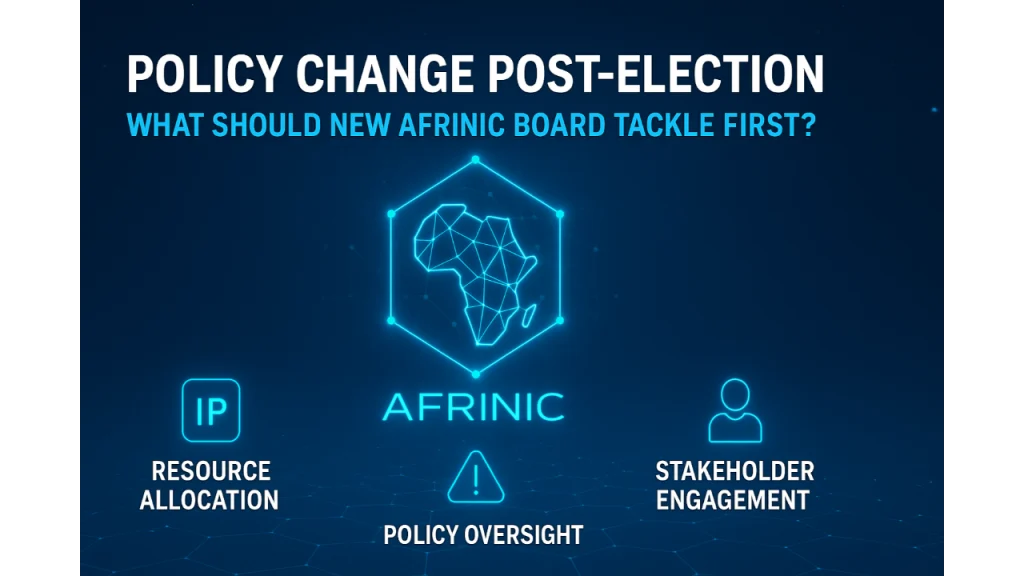- AFRINIC’s new board faces a legitimacy crisis after disputed elections.
- Rebuilding trust and ensuring bylaw compliance remain urgent priorities.
What happened: A board inherits a broken registry
The African Network Information Centre (AFRINIC) announced its new board in September 2025 after months of legal drama and annulled elections. Eight directors were confirmed following an electronic vote supervised by a court-appointed Receiver. The process was meant to restore stability, yet it has done the opposite.
Observers note that AFRINIC’s elections violated key sections of the Mauritius Companies Act, undermining the registry’s credibility and exposing it to further litigation. Analysts writing in TechCentral Africa say AFRINIC’s leadership transition is “built on uncertainty rather than reform.” The new board inherits a structure riddled with bylaw breaches and policy confusion — a problem that extends beyond individual directors to the institution’s culture itself.
Meanwhile, APNIC experts warn that AFRINIC’s instability could weaken regional coordination within the global registry system. With ICANN and the Number Resource Organization monitoring compliance, any further delay in legal or governance reform could risk AFRINIC’s recognition as Africa’s Regional Internet Registry.
Also read: AFRINIC election results face legitimacy challenge over governance breaches
Also read: AFRINIC election: Voter fraud uncovered as ECom member threatens to resign
Governance reform before policy
For the new board, the first task is not to create new policies but to fix the foundation. AFRINIC’s bylaws are contradictory and outdated, frequently clashing with Mauritius’ corporate law. Court rulings over the past two years have exposed how procedural loopholes enable manipulation of elections and membership rolls.
Policy analysts from the Internet Governance Project argue that without a total bylaw rewrite, any future decision will remain open to challenge. The registry cannot hope to represent Africa’s internet community while its own constitutional framework is so easily bent.
One of the most urgent reforms concerns proxy voting rights. The September election removed them altogether, despite being protected under the bylaws. This disenfranchised smaller operators unable to attend in person, further skewing power toward major networks and government-linked members. A credible board must restore these rights and re-establish transparent participation mechanisms before pursuing any policy change.
Also read: AFRINIC’s independence: Why rule of law must prevail over political interference
Accountability, transparency, and external review
AFRINIC’s operations have been clouded by opaque financial management and limited member oversight. Independent auditors resigned in 2019 following irregularities in IP allocations, and subsequent court filings reveal continued gaps in accountability. To regain legitimacy, the new board must invite external financial and legal review — ideally from development partners such as the African Union’s digital governance division and other neutral observers.
Equally vital is transparent reporting. AFRINIC’s tendency to publish selective updates or omit legal disclosures has further eroded community trust. Making election minutes, audit findings and court correspondence public would signal a break from the secrecy that has characterised the past five years.
Rebuilding regional confidence
Across Africa, internet service providers and civil-society groups now question whether AFRINIC can still represent them. Cloud Innovation, one of its largest members, insists that Africa needs a registry governed by law and community consent — not court orders. Some analysts suggest that if AFRINIC cannot reform, the international community may need to invoke ICP-2, allowing ICANN to accredit a successor registry capable of lawful operation.
The new board must act fast. Each month of delay deepens uncertainty for operators who rely on address allocations to expand connectivity and deploy IPv6. AFRINIC’s survival depends on returning to its founding values: transparency, accountability, and true community representation. Without that, its elections — and its authority — will remain meaningless.

